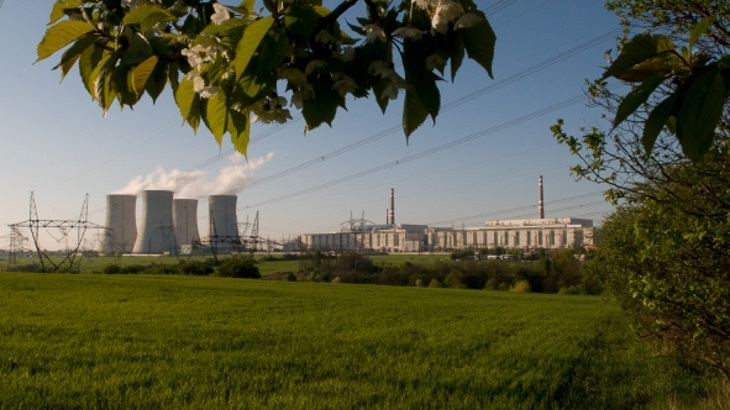Dukovany to Brno hot water heating supply pipeline takes step forward
27 March 2024
Czech nuclear power operator ČEZ and municipal heating company Teplárny Brno have signed agreements relating to a 42-kilometre pipeline from the Dukovany nuclear power plant that aims to benefit 250,000 people in the city of Brno.
 The four unit Dukovany nuclear power plant (Image: ČEZ)
The four unit Dukovany nuclear power plant (Image: ČEZ)
The strategic contracts signed cover the removal of heat from the Dukovany units to the boundary of the power plant, ČEZ said, as well as agreement on future contracts which are a condition for steps towards the construction of the heating pipe, with work scheduled to begin in 2027 and due to take about four years.
The companies say that the cogeneration production of heat will help Brno, the Czech Republic's second largest city, to cut its use of gas - possibly covering 50% of its heating needs. The pipeline is being designed to avoid built-up areas and will include tunnelled sections, including one stretch of 1100 metres in the Bobrava Nature Park.
The projected cost of the scheme is CZK19 billion (USD811 million) with part of it to be met by possible European Union subsidies as well as possible financing via commercial institutions.
Czech Prime Minister Petr Fiala said: "The construction of the heat pipe is an important step towards energy self-sufficiency and independence for Brno. If we have been saying for a long time that the basic energy source of the Czech Republic should be nuclear energy in the future, then this project fully meets the requirements and criteria. We will use the heat from the nuclear power plant, we will get rid of dependence on other fuels and we will ensure safe supply of heat to households and institutions."
ČEZ CEO Daniel Benes said he was glad the project was moving forward adding: "South Bohemia and our Temelín nuclear power plant, which uses a new heat pipe to supply heat to České Budějovice, can be an example of good practice in the use of nuclear sources for heat production."
Jiří Herman, chairman of the board of Teplárny Brno, said the project will provide more stability for heating prices for Brno: "This will fundamentally reduce the sensitivity of the price of heat to fluctuations in energy prices. Even if we consider the price of heat after 2030, the calculations show us that compared with the current price level, we can expect a positive impact - a reduction - on the price of heat."
Four VVER-440 units are currently in operation at the Dukovany site, which began operating between 1985 and 1987. Two VVER-1000 units are in operation at Temelín, which came into operation in 2000 and 2002.
Following a visit to the plant earlier this week for the announcement, the prime minister also held meetings with mayors of nearby towns and villages about plans for new nuclear power capacity at Dukovany. He noted CZK13.5 billion of transport measures and said the aim was to minimise any negative impacts on the area during construction.
Researched and written by World Nuclear News